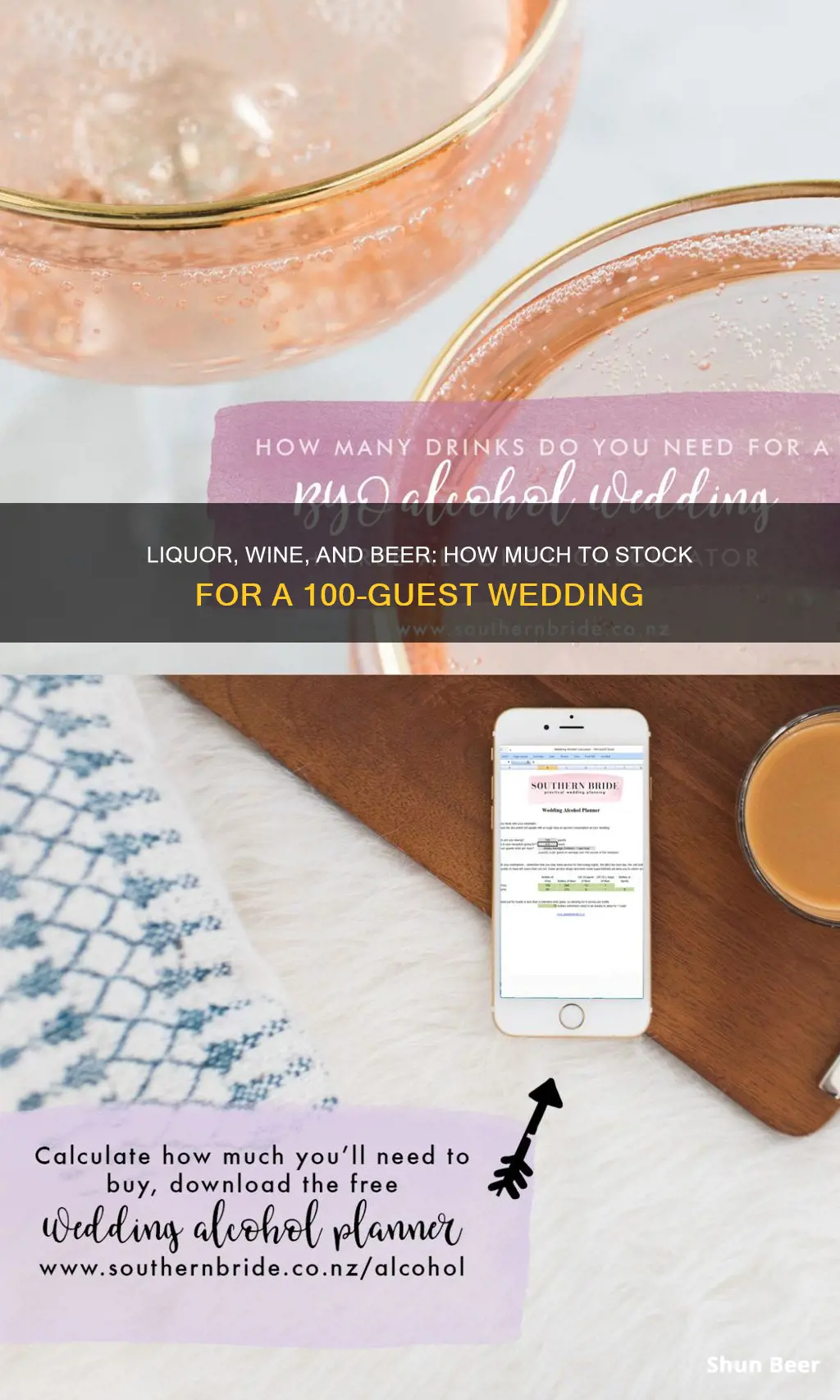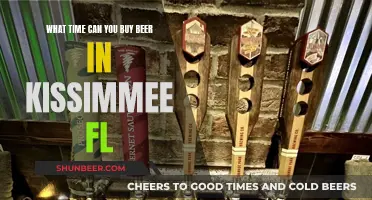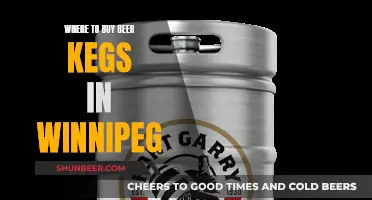
Planning a wedding can be stressful, especially when it comes to figuring out how much alcohol to buy. The amount of alcohol you'll need depends on various factors, such as the number of guests, the duration of the wedding, the drinking habits of your guests, and the type of bar you want to have. Here are some estimates and calculations to help you determine how much liquor, wine, and beer to buy for a wedding with 100 guests.
What You'll Learn

Liquor: 11-16 bottles (1L)
Planning a wedding can be stressful, especially when it comes to figuring out how much alcohol to buy. The last thing you want is to run out of drinks halfway through the reception, but you also don't want to overspend on liquor that will go unused. Here are some tips to help you estimate how much liquor to purchase for a wedding with 100 guests, assuming a ratio of 50% liquor, 25% beer, and 25% wine.
General Guidelines
According to experts, each guest is expected to consume approximately one drink per hour or about five drinks throughout the evening. This, of course, varies depending on individual drinking habits, with some guests consuming less and others more. It's also important to consider the duration of your wedding reception, typically lasting around 4-6 hours. For a 5-hour reception, with an assumption of average drinkers, you will need:
- 11-16 bottles (1L) of spirits
- 10 bottles (750 ml) of red wine
- 10 bottles (750 ml) of white wine
- 100 cans or bottles of beer
- 17 bottles (750 ml) of champagne
Factors to Consider
There are several factors that can influence the amount of liquor needed:
- Guest Count: Determine the number of guests who will be attending and are of legal drinking age.
- Drinking Habits: Consider the drinking habits of your guests. If you anticipate a higher proportion of heavy drinkers, you may need to purchase more liquor.
- Duration of Reception: The longer the reception, the more drinks your guests are likely to consume.
- Season and Climate: People tend to consume more alcoholic beverages during warmer months or in warmer climates.
- Type of Bar: The type of bar you choose can impact consumption patterns. An open bar, where guests can order any drink, may result in higher consumption compared to a limited bar or cash bar.
- Signature Cocktails: Offering signature cocktails can personalize your wedding but will also impact the amount of liquor needed.
Tips for Managing Alcohol
To ensure a smooth and enjoyable experience for your guests:
- Hire a Bartender: Consider hiring a professional bartender who can help you refine your drink selections, manage the bar, and ensure responsible serving.
- Variety of Options: Offer a variety of drink options, including beer, wine, and cocktails, to cater to different tastes.
- Signature Cocktails: Limit the number of signature cocktails to 2-3 to keep the bar service efficient and reduce complexity for your guests.
- Champagne Toast: Guests often stick to their drink of choice during a toast, so you may not need to provide a glass of champagne to every guest.
- Seasonal and Thematic Choices: Match your drink selections to the season, such as margaritas for a summer wedding, or choose drinks that align with your wedding theme.
- Non-Alcoholic Options: Don't forget to provide non-alcoholic options for underage guests or those who prefer not to drink alcohol. Mocktails, soda, and juice are great alternatives.
Buying Beer on Sundays in New York State
You may want to see also

Beer: 100-150 cans/bottles
When it comes to beer, it's important to consider the drinking habits of your guests. If you're expecting a lot of heavy drinkers, you may want to purchase more than if your guests are mostly light drinkers. As a general rule, plan for guests to have between three to five drinks, depending on how long your reception is.
Section 1:
If your wedding has 100 guests, it is recommended that you have 100 bottles or cans of beer. This is based on the assumption of one drink per guest per hour or about five drinks throughout the evening. This takes into account that some guests will drink less, but others may be thirstier.
Section 2:
Now, if you're expecting 150 guests, you'll need to adjust the amount accordingly. For this number of attendees, it is recommended to have 150 bottles or cans of beer. Again, this is based on the assumption of one drink per guest per hour, with some variation depending on individual drinking habits.
Section 3:
It's worth noting that beer drinkers can be pickier than wine drinkers. When in doubt, offer at least one well-known domestic brand and one well-known imported brand to cater to different tastes. If your friends are craft beer enthusiasts, you can impress them with an eclectic collection, including some regional brews.
Section 4:
When planning your wedding, it's a good idea to consult with a professional bartender or use a wedding drink calculator to refine your mix of liquor, wine, and beer. They can help you determine the perfect ratio and quantities to ensure your guests are happily refreshed throughout the celebration.
Kilkenny Beer: Where to Buy in the US?
You may want to see also

Wine: 10-15 bottles (750ml) of red, 10-15 bottles (750ml) of white
If you're planning a wedding, congratulations! It's an exciting time, but there's a lot to think about – especially if you're supplying the alcohol. It can be tricky to work out how much wine to buy for 100 guests, but there are some rules of thumb to help you.
Firstly, it's good to know that a standard 750ml bottle of wine holds around five glasses of wine. If you're serving wine for five hours, it's recommended that you plan for each guest to have one drink per hour, or around five drinks throughout the evening. This means that each guest will consume one bottle of wine over the course of the night. Of course, some guests will drink less, and some will drink more, but this is a good starting point.
Next, you'll need to decide on the types of wine you want to serve. A typical recommendation is to have a 50/50 split of red and white wine. So, for 100 guests, you'll need 10-15 bottles (750ml) of red wine and 10-15 bottles (750ml) of white wine.
You can also consider offering a sparkling wine, such as champagne, for a toast. If you plan to serve champagne to all your guests, you'll need around 17 bottles (750ml) for 100 guests. However, keep in mind that some guests may stick to their drink of choice, even for a toast, so you could end up with unfinished glasses of champagne.
If you're concerned about running out of wine, it's a good idea to buy a little extra. You can also consider closing the bar during the meal or for part of the reception to reduce consumption. Ultimately, the amount of wine you need will depend on your guests' drinking habits, the duration of your wedding, and your budget.
Treehouse Beer: Where to Buy and What to Know
You may want to see also

Champagne: 17-25 bottles (750ml)
When it comes to champagne, 17-25 bottles (750ml) should be enough for a wedding of 100 guests. This is based on the assumption that each guest will have around one drink per hour, or about five drinks throughout the evening. Of course, some guests will drink less, while others may drink more. It's also important to consider the duration of the reception, the drinking habits of your guests, and whether there will be a champagne toast.
If you're having a champagne toast, and this is the only time champagne will be served, you can estimate that you'll get around eight toast-sized pours from each bottle of champagne. So, for 100 guests, you'll need about 12 to 16 bottles of champagne for the toast. This leaves five to nine bottles for other drinking, which should be enough if your guests are mostly light drinkers. However, if you're expecting a lot of heavy drinkers, you may want to purchase more champagne.
It's worth noting that guests often prefer to stick with their drink of choice for the toast, so you may end up with unfinished glasses of champagne. If you're considering a champagne tower, you'll need to buy extra bottles, but this can be costly and time-consuming for large weddings.
When planning your champagne purchase, consider the following tips:
- Buy good quality mid-priced champagne.
- You can return any unused bottles or keep them for yourself.
- Don't forget to include the cost of mixers and garnishes in your budget if you're doing a DIY bar.
- If your venue charges per consumption, you may want to set a cap to avoid an unexpectedly large bill.
Strough's Beer: Where to Buy and Taste This Brew
You may want to see also

Budget: consider the cost per drink and the number of drinks
When it comes to budgeting for your wedding drinks, there are a few key considerations to keep in mind. Firstly, you'll want to estimate the number of drinks you'll need based on the number of guests and the expected duration of your wedding. Most weddings last around 4-6 hours, and a good rule of thumb is to plan for 1-2 drinks per guest per hour. This means that for a 100-guest wedding, you could expect to serve anywhere from 400 to 1200 drinks.
Next, you'll need to decide on the types of alcohol you want to serve. The most common options are beer, wine, liquor, and champagne. The proportions of each can vary depending on your guests' preferences, but a typical breakdown is 50% liquor, 25% beer, and 25% wine. Within the wine category, you may want to offer a mix of red and white wine, with a few bottles of sparkling wine for a champagne toast.
Now, let's talk about the cost per drink. This will depend on the specific brands and types of alcohol you choose. For example, a bottle of Dom Perignon champagne will be significantly more expensive than a bottle of Kirkland Signature Prosecco. When creating your wedding bar shopping list, consider the following guidelines:
- One bottle of champagne fills 6-8 glasses
- One bottle of wine fills 5 glasses
- One liter of liquor makes approximately 18 drinks
To save money, you may want to opt for a limited bar, where you offer a selection of drinks such as beer, wine, and a few signature cocktails, rather than a full open bar. Additionally, buying your alcohol in bulk or on sale can help reduce costs. Don't forget to factor in the cost of mixers, garnishes, and ice, as well as any corkage fees charged by the venue if you bring your own alcohol.
In summary, when budgeting for your wedding drinks, consider the expected number of drinks your guests will consume, the types of alcohol you want to offer, and the cost per drink. By planning carefully and making thoughtful selections, you can ensure your guests have a great time without breaking the bank.
Buying Beer at Auburn Football Games: What's the Deal?
You may want to see also
Frequently asked questions
It is recommended that you plan for each guest to have two drinks in the first hour and one drink for each additional hour. For 100 guests, this would amount to 300 drinks for a 3-hour wedding and 400 drinks for a 4-hour wedding.
The drink ratio for weddings is typically 50% liquor, 25% beer, and 25% wine. This means you would need 150 drinks from liquor, 75 drinks from beer, and 75 drinks from wine for a 3-hour wedding. For a 4-hour wedding, you would need 200 drinks from liquor, 100 drinks from beer, and 100 drinks from wine.
Liquor, wine, and beer come in different bottle or can sizes, so the number of bottles or cans you need to buy will depend on the specific drink you choose.
A standard liquor bottle (1 liter) makes around 18 drinks. For a 3-hour wedding, you would need around 8 bottles of liquor, and for a 4-hour wedding, you would need around 11 bottles.
A standard wine bottle (750 ml) makes around 5 drinks. For a 3-hour wedding, you would need around 30 bottles of wine, and for a 4-hour wedding, you would need around 40 bottles.
A standard beer bottle or can (355 ml) is approximately one drink. For a 3-hour wedding, you would need around 75 bottles or cans of beer, and for a 4-hour wedding, you would need around 100 bottles or cans.







